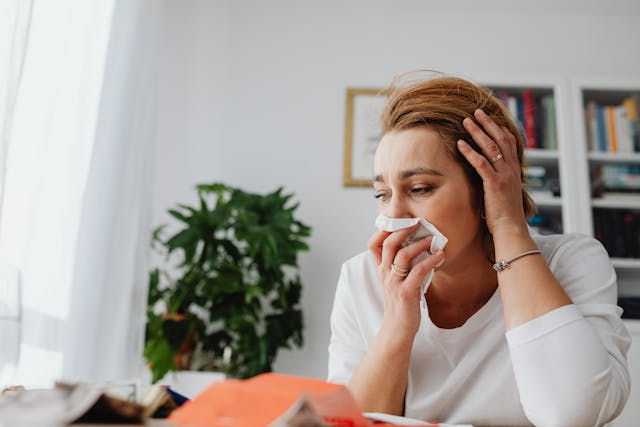How to Optimize Your HVAC System for Allergy Relief: Tips on Using Your HVAC System to Reduce Allergens in Your Home
Allergies can significantly impact your comfort and health, especially when they’re triggered by allergens within your own home. One of the best defenses against indoor allergens is a well-maintained HVAC system. By optimizing your HVAC system, you can reduce the number of allergens, such as pollen, dust mites, pet dander, and mold, helping you breathe easier all year long. In this article, we’ll explore how to adjust your HVAC system for allergy relief, from choosing the right filters to controlling humidity levels. For expert advice, Kerley Heating & Cooling offers valuable insights on creating an allergy-friendly home environment.
The Importance of Air Filtration
The first line of defense in any HVAC system when it comes to allergy relief is air filtration. A high-quality air filter can capture many of the airborne allergens that trigger allergy symptoms. Standard air filters may not be enough to remove smaller particles like pollen and pet dander, so it’s essential to choose the right filter for optimal results.
Choosing the Right Filter When selecting an air filter, it’s crucial to look for filters with a high MERV (Minimum Efficiency Reporting Value) rating. A filter with a MERV rating between 8 and 13 can effectively trap smaller particles like pollen, mold spores, and dust mites. For allergy sufferers, upgrading to a HEPA (High-Efficiency Particulate Air) filter is even more beneficial. HEPA filters can trap 99.97% of particles as small as 0.3 microns, including some of the most common allergens.
It’s important to regularly replace your filters, as clogged or dirty filters can reduce your HVAC system’s efficiency and worsen indoor air quality. Kerley Heating & Cooling recommends checking your filters every 1 to 3 months and replacing them as needed, especially during peak allergy seasons.
Humidity Control
Humidity plays a critical role in controlling allergens in your home. High humidity levels can create an ideal environment for mold and dust mites, which are common triggers for allergies. On the other hand, very low humidity levels can lead to dry air that irritates the respiratory system. Maintaining the proper humidity level is essential for allergy relief.
Ideal Humidity Levels According to Kerley Heating & Cooling, the ideal indoor humidity level is between 30% and 50%. You can measure and maintain this level by using a humidifier or dehumidifier in conjunction with your HVAC system. In areas with high humidity, a whole-home dehumidifier integrated into your HVAC system can help reduce moisture and prevent mold growth. Conversely, in dry climates, a humidifier can add moisture to the air, keeping your respiratory system from becoming irritated.
Controlling Humidity with Your HVAC System Your HVAC system can also regulate humidity levels when properly maintained. Make sure your system’s condensate drain is clear and functioning to remove excess moisture. If you have an older HVAC system that struggles to control humidity, upgrading to a system with built-in humidity control may be worth considering. Kerley Heating & Cooling can provide recommendations on systems designed to keep your home’s humidity at the perfect level for allergy relief.
Proper Ventilation
Good ventilation is another key factor in reducing allergens in your home. Your HVAC system plays a major role in circulating fresh air and preventing the buildup of allergens. Proper ventilation helps dilute and remove indoor pollutants, including allergens, ensuring a steady supply of clean, fresh air.
Improving Ventilation There are several ways to enhance ventilation in your home:
- Regularly clean air ducts: Dust and allergens can accumulate in your ductwork. Have your ducts professionally cleaned by an HVAC expert, such as Kerley Heating & Cooling, to ensure that your system is circulating clean air.
- Use an energy recovery ventilator (ERV): An ERV works with your HVAC system to exchange stale indoor air with fresh outdoor air without losing energy efficiency. This is especially helpful in airtight, energy-efficient homes where airflow is limited.
- Open windows occasionally: While this might seem counterintuitive, airing out your home on days when pollen counts are low can help bring in fresh air and reduce the concentration of indoor allergens.
Regular HVAC Maintenance
Regular maintenance of your HVAC system is crucial in keeping allergens at bay. A well-maintained system runs more efficiently and is less likely to spread allergens throughout your home.
Key Maintenance Tips for Allergy Relief
- Schedule regular tune-ups: Kerley Heating & Cooling recommends annual HVAC inspections to ensure your system is working efficiently and that components like the blower, coils, and ducts are clean.
- Clean or replace filters: As mentioned earlier, filters play a critical role in trapping allergens. Regularly clean or replace your filters to maintain optimal performance.
- Check for mold or mildew: Mold can grow in your HVAC system, particularly in areas with high humidity. During maintenance checks, make sure to inspect the system for signs of mold growth and address any moisture issues.
Additional Allergy-Reducing HVAC Solutions
Beyond regular maintenance, there are additional tools and upgrades you can integrate with your HVAC system to further reduce allergens.
- Air purifiers: Consider adding a whole-home air purifier to your HVAC system. These devices use advanced filtration and UV light to kill bacteria, mold, and viruses, providing an added layer of protection against allergens.
- UV lights: Installing UV lights within your HVAC system can help reduce mold, bacteria, and other allergens that thrive in dark, damp environments like your HVAC coils.
Final thoughts on How to Optimize Your HVAC System for Allergy Relief
Optimizing your HVAC system is one of the most effective ways to reduce allergens and improve indoor air quality. From selecting the right filters to controlling humidity and ensuring proper ventilation, taking these steps can significantly reduce allergens in your home. For personalized advice and expert HVAC maintenance, reach out to Kerley Heating & Cooling, who specialize in helping homeowners achieve allergy relief through optimized HVAC systems. By following these tips, you can create a cleaner, healthier living environment and keep allergy symptoms under control.
Want More Info? How about a Free 30-minute Consult with Ascend?
Schedule My Free Consultation Now!
Special thanks to the following source(s) for the image(s) used in this article:
- Pexels: https://www.pexels.com/photo/unhappy-woman-crying-at-home-5900145/
Enjoy a Great Podcast? ?
Check out this Remarkable episode to continue the conversation and help you grow!

Unwavering Tenacity, Risk Adjusted Return, & the Importance of Service to Others with David Steele
"If you want advice from someone, ask for money. If you want money from someone, ask for advice." ~ David SteeleWATCH THE PODCAST Click the play button ▶️ above 👆 to watch now! Please Note: You can skip any ads after 5-seconds by clicking, "Skip Ad" in the bottom-right corner of the video window. These are not ads we control, or necessarily endorse. They are delivered by the video hosting company, YouTube or Rumble. Thank you for...
 Listen Now!
Listen Now!
THANKS FOR LISTENING TO THE REMARKABLE PEOPLE PODCAST! ?
Click Here for More Remarkable Episodes on Almost Any Topic You Can Imagine.?
DISCLAIMER: This is an affiliate article. We post affiliate articles with the intent of helping you grow. They are not written, researched, or necessarily endorsed by our team. They are simply content submitted to us by what appears to be respectable affiliate sources, people, and organizations, which upon initial review, seem solid and helpful to our community, so we post them. It is up to you to personally verify the facts, links, organizations mentioned, the validity of the information presented, and any/all claims made in the article(s). To report an issue with any of the information, links, or organizations mentioned in this, or any content posted on our website, or if you simply have a question or need something we can help you with, please contact us now.






